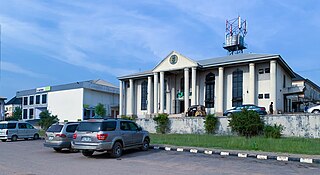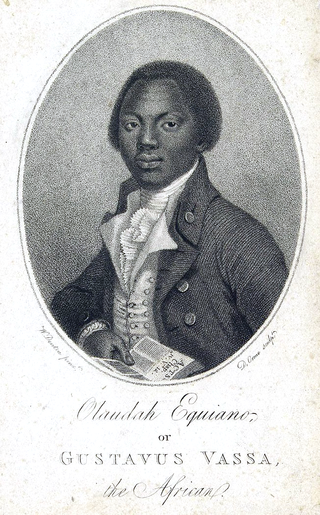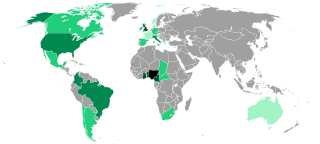
Igbo is the principal native language cluster of the Igbo people, an ancient ethnicity in the Southeastern part of Nigeria.

The Igbo people are an ethnic group in Nigeria. They are primarily found in Abia, Anambra, Ebonyi, Enugu, and Imo States. A sizable Igbo population is also found in Delta and Rivers States. Ethnic Igbo populations are found in Cameroon, Gabon, and Equatorial Guinea, as migrants as well as outside Africa. There has been much speculation about the origins of the Igbo people, which are largely unknown. Geographically, the Igbo homeland is divided into two unequal sections by the Niger River—an eastern and a western section. The Igbo people are one of the largest ethnic groups in Africa.

Nnamdi Benjamin Azikiwe, PC, usually referred to as "Zik", was a Nigerian statesman, revolutionary and political leader who served as the 3rd governor-general of Nigeria between 1960 and 1963 and the 1st president of Nigeria during the First Nigerian Republic which existed from 1963 to 1966. Considered a driving force behind the nation's independence, he came to be known as the "father of Nigerian nationalism".

Onitsha is a city on the eastern bank of the Niger River, in Anambra State, Nigeria. A metropolitan city, Onitsha is known for its river port and as an economic hub for commerce, industry, and education. It is one of the largest metropolitan area in Nigeria with a fast growing population of over 8 million people. It hosts the Onitsha Main Market, the largest market in Africa in terms of geographical size and volume of goods. Onitsha and neighboring Asaba on the western bank of the Niger River form a continuous metropolitan area.

The culture of Nigeria is shaped by Nigeria's multiple ethnic groups. The country has 527 languages, seven of which are extinct. Nigeria also has over 1150 dialects and ethnic groups. The three largest ethnic groups are the Hausas that are predominantly in the north, the Yorubas who predominate in the southwest, and the Igbos in the southeast. There are many other ethnic groups with sizeable populations across the different parts of the country. The Kanuri people are located in the northeast part of Nigeria, the Tiv people of north central and the Efik-Ibibio are in the south south. The Bini people are most frequent in the region between Yorubaland and Igboland.
Kaiso is a type of music popular in Trinidad and Tobago, and other countries, especially of the Caribbean, such as Grenada, Belize, Barbados, St. Lucia and Dominica, which originated in West Africa particularly among the Efik and Ibibio people of Nigeria, and later evolved into calypso music.
Clogging or Flatfoot dancing is a type of folk dance practiced in the United States, in which the dancer's footwear is used percussively by striking the heel, the toe, or both against a floor or each other to create audible rhythms, usually to the downbeat with the heel keeping the rhythm.

Igboland, also known as Southeastern Nigeria, is the indigenous homeland of the Igbo people. It is a cultural and common linguistic region in southern Nigeria. Geographically, it is divided into two sections by the lower Niger River: an eastern and a western one. Its population is characterised by the diverse Igbo culture and the speakers of equally diverse Igbo languages.

The Interesting Narrative of the Life of Olaudah Equiano, Or Gustavus Vassa, The African, first published in 1789 in London, is the autobiography of Olaudah Equiano, an African from what is now Nigeria who was enslaved in childhood and eventually earned his freedom and became an abolitionist in the United Kingdom.

E. Nolue Emenanjo was a Nigerian academic scholar, professor, writer and critic who is regarded as a central figure of Igbo literature. His book, A Grammar of Contemporary Igbo: Constituents, Features and Processes (2015), strongly added input to research of Igbo literature and culture. Along with his publications, his Igbo Language and Culture (1975) and Elements of Modern Igbo Grammar (1978). Later books include Auxiliaries in Igbo Syntax (1985) and Multilingualism, Minority Languages, and Language Policy in Nigeria (1990). In the 21st century, Emenanjo is often referred to as the "father of Igbo literature", alongside Tony Ubesie and others.

Nigerians or the Nigerian people are citizens of Nigeria or people with ancestry from Nigeria. The name Nigeria was derived from the Niger River running through the country. This name was allegedly coined in the late 19th century by British journalist Flora Shaw, who later married Baron Frederick Lugard, a British colonial administrator. Nigeria is composed of various ethnic groups and cultures and the term Nigerian refers to a citizenship-based civic nationality. Nigerians derive from over 250 ethno-linguistic groups. Though there are multiple ethnic groups in Nigeria, economic factors result in significant mobility of Nigerians of multiple ethnic and religious backgrounds to reside in territories in Nigeria that are outside their ethnic or religious background, resulting in the mixing of the various ethnic and religious groups, especially in Nigeria's cities. The English language is the lingua franca of Nigerians. Nigeria is divided roughly in half between Muslims, who live mostly in the north, and Christians, who live mostly in the south; indigenous religions, such as those native to the Igbo and Yoruba ethnicities, are in the minority.

Igbo Americans, or Americans of Igbo ancestry, are residents of the United States who identify as having Igbo ancestry from modern day Nigeria. There are primarily two classes of people with Igbo ancestry in the United States, those whose ancestors were taken from Igboland as a result of the transatlantic slave trade before the 20th century and those who immigrated from the 20th century onwards partly as a result of the Nigerian Civil War in the late 1960s and economic instability in Nigeria. Igbo people prior to the American Civil War were brought to the United States by force from their hinterland homes on the Bight of Biafra and shipped by Europeans to North America between the 17th and 19th centuries.
Igbo culture are the customs, practices and traditions of the Igbo people of southeastern Nigeria. It consists of ancient practices as well as new concepts added into the Igbo culture either by cultural evolution or by outside influence. These customs and traditions include the Igbo people's visual art, music and dance forms, as well as their attire, cuisine and language dialects. Because of their various subgroups, the variety of their culture is heightened further.

The Igbo of Igboland became one of the principal ethnic groups to be enslaved during the Atlantic slave trade. An estimated 14.6% of all enslaved people were taken from the Bight of Biafra, a bay of the Atlantic Ocean that extends from the Nun outlet of the Niger River (Nigeria) to Limbe (Cameroon) to Cape Lopez (Gabon) between 1650 and 1900. The Bight’s major slave trading ports were located in Bonny and Calabar.

Echie administratively known as Etche is an indigenous Igbo group mostly found in the Niger Delta of Nigeria. Presently, its people makeup Etche and Omuma, two of the 23 Local Government Areas of Rivers State the can also been found in Ngor okpala l.G.A and omuma town both in imo state. They are part of the 13 federal constituencies representing River State in Nigeria's National Assembly and part of the Rivers East Senatorial District. Its people are mostly farmers and they speak the Etche dialect of the Igbo language family.
Igbo people in Jamaica were trafficked by Europeans onto the island between the 18th and 19th centuries as enslaved labour on plantations. Igbo people constituted a large portion of the African population enslaved people in Jamaica. Jamaica received the largest amount of enslaved people from the biafra region than anywhere else in the diaspora during the slave trade. Some slave censuses detailed the large number of enslaved Igbo people on various plantations throughout the island on different dates throughout the 18th century. Their presence was a large part in forming Jamaican culture, Igbo cultural influence remains in language, dance, music, folklore, cuisine, religion and mannerisms. In Jamaica the Igbo were often referred to as Eboe or Ibo. There are a substantial number of Igbo language loanwords in Jamaican Patois. Igbo people mostly populated the northwestern section of the island.
Yoruba Americans are Americans of Yoruba descent. The Yoruba people are a West African ethnic group that predominantly inhabits southwestern Nigeria, with smaller indigenous communities in Benin and Togo.

The Olukumi people a bilingual Anioma group of the Aniocha North area of the Delta State, Nigeria. They originate from Yoruba people and settled in this area long ago. The Olukumi occupy eight communities west of the Niger river, and are together known today as the Odiani Clan in Aniomaland. Ukwu Nzu town is the historical headquarters of the Olukumi people and is traditionally headed by the Obi of Ukwu Nzu, Agbogidi. The present Obi is H.R.M. Obi Ogoh 1. Olukumi villages select leaders through the Okpala Obi system, which is the Okpala (gerontocracy).
Thomas John Dennis (1869-1917) was an Anglican priest who was the main translator of the Bible into the Igbo language.

Igbo literature encompasses both oral and written works of fiction and nonfiction created by the Igbo people in the Igbo language. This literary tradition reflects the cultural heritage, history, and linguistic diversity of the Igbo community. The roots of Igbo literature trace back to ancient oral traditions that included chants, folk songs, narrative poetry, and storytelling. These oral narratives were frequently recited during rituals, childbirth ceremonies, and gatherings. Proverbs and riddles were also used to convey wisdom and entertain children.













